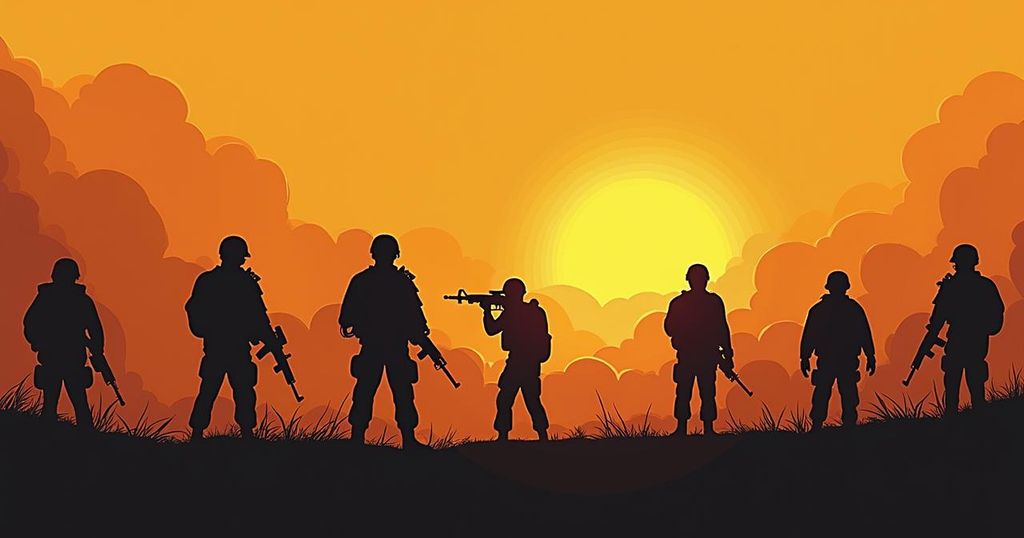Escalating Tensions: Hezbollah and Israeli Forces Engage Amid Gaza Strikes
The recent escalation of conflict between Hezbollah and Israeli forces in Lebanon coincides with increased Israeli airstrikes in Gaza, resulting in significant casualties and a humanitarian crisis among displaced families. Political responses from both the US and global leaders reflect deep concerns over the potential for further escalation in the region. The International Rescue Committee has reported critical shortages of basic necessities among affected populations, particularly children.
Tensions in the Middle East are escalating as Hezbollah engages with Israeli troops in southern Lebanon, amid intensified Israeli airstrikes in Gaza following a recent Hezbollah attack. Israeli reports indicate that helicopters have been deployed to evacuate wounded soldiers from the affected border region. Concurrently, a tragic incident in Gaza has seen an Israeli airstrike targeting the home of journalist Ahmed al-Zard, resulting in multiple fatalities within his family and leaving him and others seriously injured. Although rescue efforts have been complicated by continued gunfire from Israeli forces, there remain individuals trapped under the rubble of the demolished home. The situation has prompted several Republican officials in the United States to advocate for military action against Iran in response to an increase in missile attacks directed toward Israel. A spokesperson for the Jordanian government noted that as a result of regional tensions, minor injuries were reported, and assessments of damage are underway. Jordan firmly maintains its role in ensuring national safety and has stated unequivocally that it will not serve as a battleground for any involved party. International responses include condemnation from Australian Prime Minister Anthony Albanese, who described Iran’s missile assault as a “dangerous escalation,” emphasizing Australia’s commitment to de-escalation efforts in the region. Both US vice-presidential candidates expressed steadfast support for Israel, aligning with positions taken by the Biden administration regarding coordination with Israeli officials during ongoing military operations. Reports reveal this unprecedented level of direct US involvement in the conflict. Japan’s new Prime Minister Shigeru Ishiba followed suit, denouncing Iran’s actions and advocating for cooperative measures with the United States to prevent escalation. On the Iranian side, commentators like Negar Mortazavi suggest the missile barrage is framed as a warning against Israeli aggressions, indicating Iran’s position against war yet acknowledging the necessity of a response to perceived threats. Humanitarian crises were highlighted by the International Rescue Committee (IRC), which reported that a significant number of displaced Lebanese families are lacking fundamental necessities like food, shelter, and health care. With a considerable portion of those affected being children, the IRC calls attention to alarming gaps in health services and the dire conditions faced by refugees, further exacerbated by the unstable situation resulting from the conflict.
The article details the ongoing conflict between Israel and Hezbollah along with Israel’s military operations in Gaza amidst rising tensions in the broader Middle East. It highlights the humanitarian crises faced by those affected by the conflict, including displaced families and children suffering from the fallout of violence. Various domestic and international political responses to these developments indicate a growing concern among world leaders regarding stability in the region and the potential escalation of military actions involving Iran.
In conclusion, the recent hostilities in Lebanon and Gaza underscore an alarming escalation in military engagements, with grave repercussions for civilian populations. International leaders are calling for de-escalation while reiterating their support for Israel against perceived threats. The humanitarian situation continues to deteriorate, particularly among displaced families, as multiple nations grapple with the ramifications of the ongoing conflict and the urgent need for coordinated responses.
Original Source: www.aljazeera.com




Post Comment